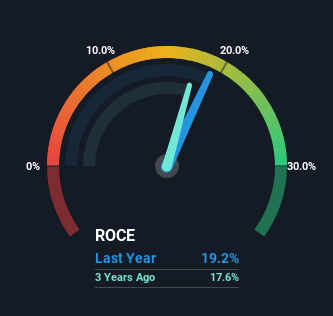- United States
- /
- Electrical
- /
- NYSE:ROK
Rockwell Automation (NYSE:ROK) May Have Issues Allocating Its Capital

If we want to find a potential multi-bagger, often there are underlying trends that can provide clues. Ideally, a business will show two trends; firstly a growing return on capital employed (ROCE) and secondly, an increasing amount of capital employed. Basically this means that a company has profitable initiatives that it can continue to reinvest in, which is a trait of a compounding machine. Although, when we looked at Rockwell Automation (NYSE:ROK), it didn't seem to tick all of these boxes.
What Is Return On Capital Employed (ROCE)?
For those that aren't sure what ROCE is, it measures the amount of pre-tax profits a company can generate from the capital employed in its business. Analysts use this formula to calculate it for Rockwell Automation:
Return on Capital Employed = Earnings Before Interest and Tax (EBIT) ÷ (Total Assets - Current Liabilities)
0.19 = US$1.5b ÷ (US$11b - US$3.3b) (Based on the trailing twelve months to December 2023).
Thus, Rockwell Automation has an ROCE of 19%. On its own, that's a standard return, however it's much better than the 14% generated by the Electrical industry.
See our latest analysis for Rockwell Automation

Above you can see how the current ROCE for Rockwell Automation compares to its prior returns on capital, but there's only so much you can tell from the past. If you'd like to see what analysts are forecasting going forward, you should check out our free analyst report for Rockwell Automation .
So How Is Rockwell Automation's ROCE Trending?
On the surface, the trend of ROCE at Rockwell Automation doesn't inspire confidence. To be more specific, ROCE has fallen from 36% over the last five years. Although, given both revenue and the amount of assets employed in the business have increased, it could suggest the company is investing in growth, and the extra capital has led to a short-term reduction in ROCE. And if the increased capital generates additional returns, the business, and thus shareholders, will benefit in the long run.
In Conclusion...
In summary, despite lower returns in the short term, we're encouraged to see that Rockwell Automation is reinvesting for growth and has higher sales as a result. And the stock has followed suit returning a meaningful 68% to shareholders over the last five years. So while the underlying trends could already be accounted for by investors, we still think this stock is worth looking into further.
If you'd like to know about the risks facing Rockwell Automation, we've discovered 1 warning sign that you should be aware of.
If you want to search for solid companies with great earnings, check out this free list of companies with good balance sheets and impressive returns on equity.
New: AI Stock Screener & Alerts
Our new AI Stock Screener scans the market every day to uncover opportunities.
• Dividend Powerhouses (3%+ Yield)
• Undervalued Small Caps with Insider Buying
• High growth Tech and AI Companies
Or build your own from over 50 metrics.
Have feedback on this article? Concerned about the content? Get in touch with us directly. Alternatively, email editorial-team (at) simplywallst.com.
This article by Simply Wall St is general in nature. We provide commentary based on historical data and analyst forecasts only using an unbiased methodology and our articles are not intended to be financial advice. It does not constitute a recommendation to buy or sell any stock, and does not take account of your objectives, or your financial situation. We aim to bring you long-term focused analysis driven by fundamental data. Note that our analysis may not factor in the latest price-sensitive company announcements or qualitative material. Simply Wall St has no position in any stocks mentioned.
About NYSE:ROK
Rockwell Automation
Provides industrial automation and digital transformation solutions in North America, Europe, the Middle East, Africa, the Asia Pacific, and Latin America.
Established dividend payer with adequate balance sheet.

